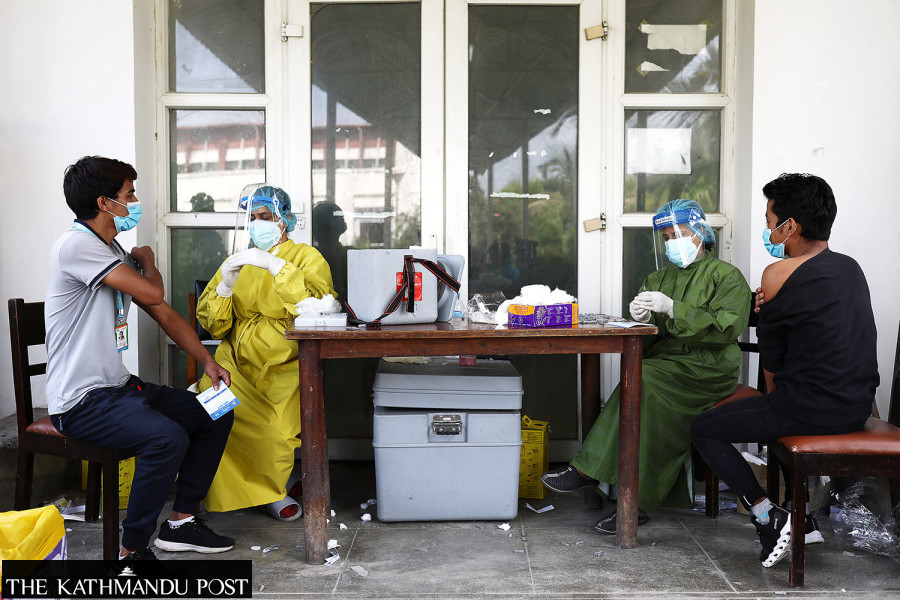Health
Amid spike in Covid cases in India, ministry urges all to take booster shots
Authorities in Nepal should step up surveillance both at border points and in communities, experts say.
Arjun Poudel
With new Covid-19 cases surging in neighbouring India, Nepal’s Ministry of Health and Population has requested all to take booster shots at the earliest.
As vaccines are the only reliable and proven means to lessen severity and deaths from coronavirus infections, officials say, one should not wait until the new surge to take the booster shots.
“Vaccines are available. The vaccine is the only available option to fight the coronavirus,” said Dr Roshan Pokhrel, secretary at the Health Ministry. “We have been requesting all to take booster shots if they have not taken yet and administer booster shots to children between 12 and 17 years if they were given second doses three months ago.”
More new cases of Covid-19 have been reported lately in several states of India, including in New Delhi and Maharashtra, where thousands of Nepalis live and work and frequently travel back and forth between the two countries.
India on Saturday reported a total of 8,329 new coronavirus infections and at least 10 deaths. Reports suggest the daily Covid-19 cases are on the rise. The positivity rate was 2.41 percent on Friday, while the weekly average is 1.75 percent, according to media reports.
The Maharashtra State of India has been currently experiencing a sudden spike in daily Covid-19 cases—3,081 on Friday and of them 1,956 infections were recorded in Mumbai, the capital, alone.
Mumbai has also recorded a sharp spike in the number of hospitalisations.
“We have already alerted our health desks set up at the border points and asked the agencies concerned to increase surveillance,” said Pokhrel, the secretary.
Experts say the rise in new cases in India is a matter of concern since there is an uninterrupted cross-border movement every day. Nepal and India share an 1,800-kilometre open border through which thousands of people cross over into each other’s territory on a daily basis.
“Although there is no need to panic, what one should not forget is that the coronavirus is an RNA virus and it keeps on mutating and that Covid-19 threats are not over yet,” said Dr Prabhat Adhikari, an infectious disease and critical care expert. “We should closely monitor if the infection has increased hospitalisations and deaths.”
Nepal lately has been reporting fewer cases, which experts say could make people complacent.
On Saturday, 17 people tested positive (nine in 1,193 polymerase chain reaction tests and eight in 980 antigen tests) throughout the country. According to the Health Ministry, the number of active cases across the country is 107.
Nepal over the last years has seen a sudden spike in cases when there is a surge in infections in India. If the trend is anything to go by, it takes about three weeks for the spike in cases after India.
Doctors say authorities should closely monitor the virus variant circulating in the country. For that, regular whole-genome sequencing is necessary. The Health Ministry said that it has been carrying out whole-genome sequencing on a regular basis within the country. There are at least five laboratories in the country that can carry out whole genome sequencing.
Earlier, in April, when new cases surged in India, experts had warned of a similar situation in Nepal. Doctors say it could be because of the vaccination, but they warn against complacency.
“It has already been six months since most of the people took the second dose of the vaccine,” said Dr Sher Bahadur Pun, chief of Clinical Research Unit at Sukraraj Tropical and Infectious Disease Hospital. “Studies show that immunity gained from the vaccination wanes over the period.”
Doctors say a new variant of the virus could be responsible for the surge in new infections in India. According to them, the virus variant may not be of mild type and concerned authorities should take the issue seriously and take necessary steps to mitigate the risk of the spread in the country.
“We can compare the second and third waves of the pandemic. The second wave was more lethal but more people got infected in the third wave. The virus variant, however, killed less people than in the second wave,” said Pun. “If the hospitalisation rate goes up, we should step up measures and closely monitor the situation.”
The Health Ministry started administering booster shots on January 17 but so far only 5,204,193 people have taken the booster shots.
With the infection rate declining after the third wave driven by the Omicron variant, the uptake of vaccines, including the booster shots, has declined.
A study carried out in Nepal also showed a decline in immunity level after a certain time of vaccination.
Nepal launched its vaccination drive on January 27, 2021 with 1 million doses of Covishield, the AstraZeneca type vaccine manufactured by the Serum Institute of India.
Nepal needs to vaccinate around 90 percent of its 29,192,480 population, or over 25 million people. As of Saturday, 19,981,665 people—68.4 percent of the total population—have been fully vaccinated.
The Health Ministry has been preparing to launch a campaign to administer vaccines to children aged between five and 11 years.
Officials say as vaccination is open for all eligible people, there will not be any special campaign for those who have not taken any dose of vaccine yet. The Health Ministry, however, has no data on the people who have not taken even the first dose of the vaccine yet.
Nepal has so far received 53,381,570 doses of vaccines of various brands—AstraZeneca, Vero Cell, Moderna, Janssen, Sinovac-CoronaVac and Pfizer-BioNTech.




 11.84°C Kathmandu
11.84°C Kathmandu















